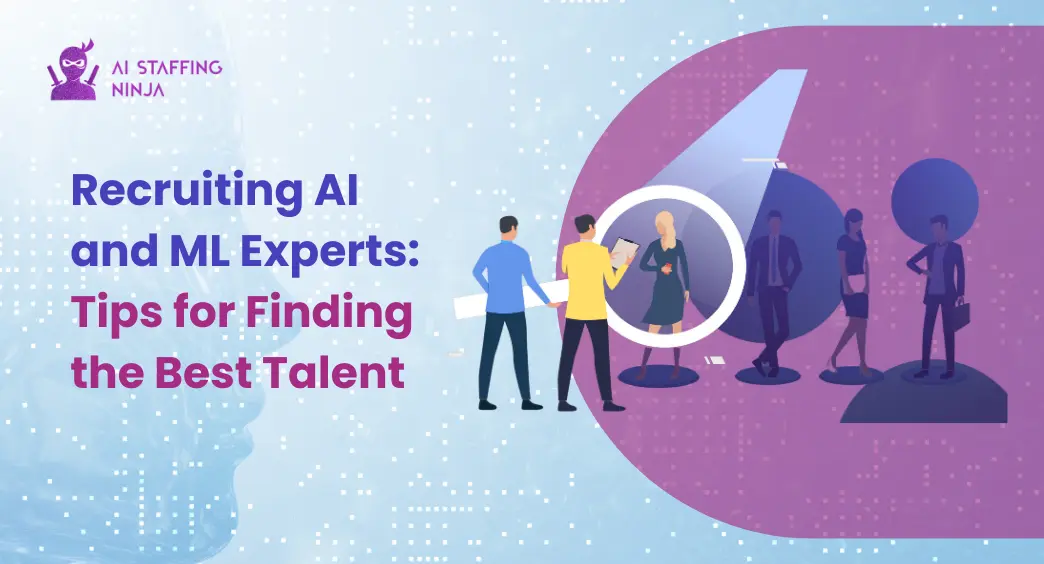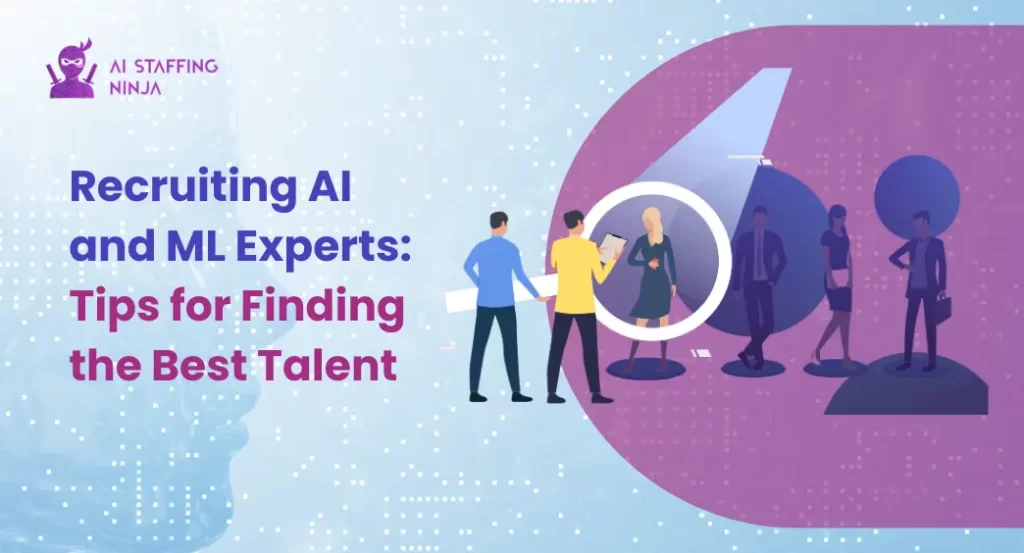
- By : By Staffing Ninja
How Recruiters Can Identify Top AI and ML Talent

Amid the current conditions of unprecedented levels of technological disruption, the need for AI and ML professionals in various industries is soaring. In various industries like healthcare, finance, retail, and manufacturing, organizations are eagerly adopting AI and ML to gain a competitive edge and drive growth. This surge in demand has created a unique challenge for recruiters: recruiting and acquiring the best talent in AI and ML, entering a world of talent scarcity in this space.
Introducing AI Staffing Ninja, one of the most precisely aimed recruitment agencies helping firms seek out and attract top-notch AI and ML professionals. AI Staffing Ninja is a tool that connects talented and screened candidates with employers who seek to advance their AI/ML businesses as professionals who understand all the industry’s intricacies create it.
Understanding AI and ML Talent
AI and machine learning talent include people with certain academic backgrounds, problem-solving skills, and expertise in the field. These are not merely employees who code or analyze data; they are creators with the ability to design and execute enhanced business AI procedures and ML approaches.
Key Skills and Qualifications
While looking for the best candidates in AI and ML, recruiters should not ignore soft skills that are essential to working with competitive technologies. From the technical aspects, the candidate should show knowledge in programming languages such as Python, R, or Java and, indeed, should have a mastery of machine learning algorithms and frameworks. Knowledge in deep learning, neural networks, NLP, and computer vision will be considered an advantage. Moreover, it is quite common that prior experience with big data technologies or cloud platforms is mandatory or very desirable in the AI/ML field today.
Focused as they are on data analysis, AI and ML employees also need the hard and soft skills that support performance in flux. Analysis and problem-solving skills remain paramount, and logical thinking also has to be combined with excellent communication skills. As much as there is talent in excellent performers, insight and enthusiasm for learning grow up and down, which is crucial within a sector that quickly changes. This means that there should also be the ability to adapt to new technologies and methodologies from the recruiters.
Experience Levels
Employers usually categorize skilled talents working in the domains of AI and ML into three levels or experiences. Entry-level candidates include candidates who have little or no experience and those candidates who have worked for only about 1-3 years. They often possess sound theoretical understanding but are not so experienced in practice. Intermediate-level employees with 3-5 years of experience have a good understanding of AI/ML and practices in multiple projects. The advanced-level employees for the Artificial Intelligence/Machine Learning function are likely to be experts with at least 5 years of experience in the IT industry, in-depth knowledge of the technology and leadership competency, and a successful AI/ML implementation background.
Recruiters should choose the level of experience consistent with the needs of a particular company, as well as project complexity, team organization, and financial resources. There is a target for each one, and the key is to find which kind of personnel are best suited to each level for the goals of the organization when taking into account the existing team.
Techniques for Identifying Top AI and ML Talent
Technical Assessment
In order to make sure a candidate is proficient in working with AI and ML algorithms, programming languages, and tools, recruiters have to approach the matter in several directions. Hiring managers can discover the candidate’s authentic skills when faced with coding challenges presenting actual AI/ML problems. Evaluating their designing nature to come up with the right algorithms to use in executing the various AI/ML functions gives an understanding of their solution-finding skills. The assessment of their knowledge regarding prevalent AI/ML frameworks and libraries is also important.
Portfolio Review
It is always useful to look at a candidate’s portfolio because they can give a lot of information about their skills and work. Recruiters should study previous work experience and its intensity, as well as the presence or absence of participation in open-source projects related to AI/ML, and consider available published papers and technical blog posts. This great review can show the depth of the knowledge of a candidate, his or her creativity, and capacity to use AI/ML concepts to solve real-life problems.
Problem-Solving Abilities
The candidates’ aptitude test focuses on the AI and ML problems and their approach to solving them. Sharing cases and evaluating their way of solving them may demonstrate their styles and ways of handling other unknown issues. Achieving these goals is possible through behavioral interviews to grasp their handling of challenges and hypothetical questions to determine their coping style and preferences.
Industry-Specific Knowledge
Domain Expertise
Domain expertise is important in a significant number of AI/ML job arrangements. Employers should determine their candidates’ knowledge of the industry to which they will be applying: healthcare, finance, retail, and others. Understanding of how the specific industry works, as well as their overall aptitude for applying AI/ML to the problems faced by their industry and their knowledge of any existing or proposed regulations or ethically questionable practices that may be associated with AI/ML solutions for this industry, can help set top candidates apart.
Relevant Experience
The area of practical experience and participation in the relevant industry may be even more crucial in this case. When assessing learners for their ability to work within certain industries, I examine their previous work and assignments in the same contexts. It is equally beneficial to evaluate their knowledge of domain-specific sources of data and skills in applying industry domain knowledge to generate AI/ML solutions.
Soft Skills and Team Fit
Communication Skills
AI/ML positions require good communication proficiencies. Employers should be able to test the candidate on how effectively he can present technical issues to management, look into written communication through reports or blogs, and assess the client-facing roles of an individual.
Collaboration and Leadership
AI/ML projects sometimes may need the collaboration of different people and project management. They can also ask applicants about their previous work experience in a cross-functional team, whether they can teach and guide junior team members, and what project management experience is suitable for senior positions.
Evaluating AI and ML Projects
Project Complexity
Thus, recruiters have to determine whether the problems solved at a particular stage were small or large-scale to evaluate the candidate’s aptitude for the work. Because highly developed AI/ML techniques are used in many fields, it is possible to evaluate the level of technique used and the complexities faced during its implementation in relation to the candidate.
Impact and Innovation
The question of how the projects constructed by candidates translate in the real world is important. Effective self-organization for recruiters implies an evaluation of the business impact of the work accomplished, as well as the assessment of whether any novelties have been introduced in the process and if there has been an acknowledgment of their work as awards, patents, or citations.
Conclusion
Recruiting AI and ML talent involves more than posting job ads; therefore, there is a need to adopt more elaborate strategies. Through stringent parameters such as technical competency, problem-solving competency, business competency, and interpersonal competency, it is feasible to source qualified personnel who will bear the optimum effects of AI/ML practices.
Recruiters have to compete in this environment and, therefore, need to maintain personal development on the subject of AI/ML. Allying with expert agencies like AI Staffing Ninja can be extremely beneficial in dealing with the already-mentioned challenges and finding the smartest people to work in the AI & ML industries.
Do not underestimate the value of finding the right talent since it will help turn a good AI/ML project into a great one. Spend the time and effort to locate the most skilled AI and ML professionals and see your organization’s technological potential reach great heights.
- Tags :
- AI and ML Recruitment
- AI talent
